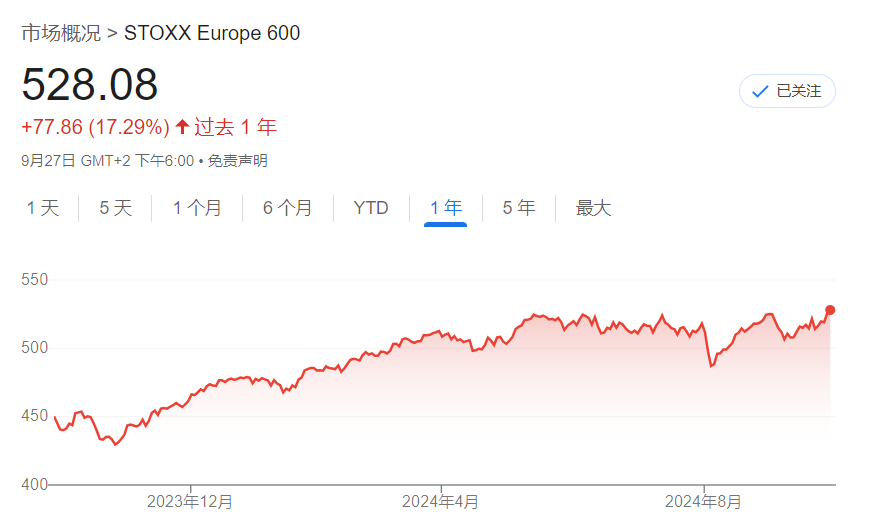您们的需要 我们的专注
Your Needs Our Focus
财经快讯
經濟不斷下滑,股市不斷新高,歐股還撐得住嗎?
各國央行輪番降息、中國“政策大禮包”點燃全球樂觀情緒,本周五歐洲股市收盤再創新高。泛歐Stoxx 600指數收漲0.47%至新高,德國股指漲1.7%創新高,奢侈品股跳漲,LVMH和開雲集團均漲近10%。
今年以來,歐股走勢強勁頻創新高。然而,對於歐股後續走勢,高盛集團、貝萊德及北方信托資產管理公司的基金經理們表示擔憂,認為歐股上漲面臨嚴峻挑戰。
他們警告稱,投資者需警惕歐洲經濟下滑及其對企業盈利的沖擊風險。此外,美國大選的變數為市場增添了新的不確定性。隨著2024年進入最後一個季度,市場情緒日益動蕩。歐股上半年強勁的漲勢已在過去幾個月轉化為波動頻繁的局面。

歐洲通脹降溫但經濟萎縮,股市上漲動力不足
歐洲經濟疲軟與該地區股市創新高形成鮮明對比。盡管通脹進一步降溫、法國、西班牙通脹率跌破2%,但歐元區私營部門活動本月出現萎縮,德國經濟衰退的風險愈加突出。
9月歐元區綜合PMI降至48.9,為今年2月以來首次低於榮枯線。德法雙雙加速萎縮,德國綜合PMI初值連續第四個月下降,法國服務業重新陷入收縮,制造業銷售額下降明顯。
北方信托資產管理公司因對宏觀經濟前景的擔憂,本周將其對歐股的配置從增持調降至中性。該公司全球配置首席投資官Anwiti Bahuguna指出:
經濟數據不穩,盡管通脹有所下降,但幅度不足以支持大幅降息。目前的市場環境並不適合承擔過高風險。
美國大選增添不確定性
歐洲基準指數自5月創下歷史高點後,屢次未能突破這一阻力位,顯示該點位仍是市場的關鍵障礙。分析指出,如果特朗普在美國大選中獲勝,可能對歐洲企業的收入造成重大影響。
巴克萊策略師警告稱,若這引發歐美之前的“貿易摩擦”,歐洲企業的盈利增長將遭到顯著拖累,尤其是德國和意大利股市,以及資本貨物、汽車、科技等行業首當其沖。
法國國內的政治不確定性也對該地區股市構成壓力,巴黎市場表現遜於其他主要股指,投資者對新政府的穩定性心存疑慮。
貝萊德歐洲、中東和非洲基本股票首席投資官Helen Jewell表示,歐股目前處於高度敏感階段:
美國大選結果難以預測,宏觀經濟前景同樣充滿不確定性,市場的脆弱性或將持續至2025年。
歐股走勢關鍵在企業盈利
巴克萊和花旗集團的策略師稱,中國的政策措施可能對礦業、汽車制造和非必需消費品等周期性股票產生積極影響。分析認為,中國近期推出的刺激政策可能是推動歐洲斯托克600指數年底上漲的關鍵,畢竟該指數成分股中約8%的收入來自中國。
不過,安盛投資銀行歐洲股票主管Gilles Guibout提醒,未來歐股走勢關鍵將在於企業盈利。他說:
最終,市場未來的走向將取決於即將公布的公司收益表現。
歐企即將於10月中旬公布的第三季度業績,對於評估歐洲經濟放緩對消費需求的影響至關重要。
摩根大通的分析師警告稱,諾和諾德的暢銷減肥藥Wegovy的銷售可能低於預期,這或許是本季度業績走勢的早期信號之一。同時,瑞典的H&M也表示,其關鍵利潤目標難以實現,零售行業前景日趨堪憂。
風險提示及免責條款
市場有風險,投資需謹慎。本文不構成個人投資建議,也未考慮到個別用戶特殊的投資目標、財務狀況或需要。用戶應考慮本文中的任何意見、觀點或結論是否符合其特定狀況。據此投資,責任自負。

